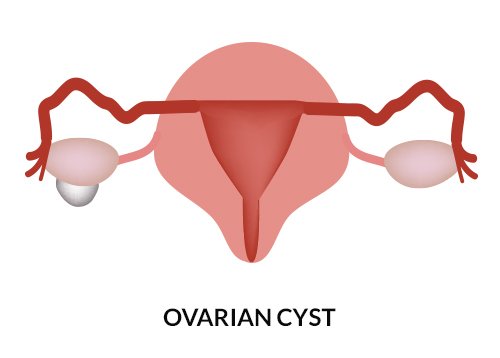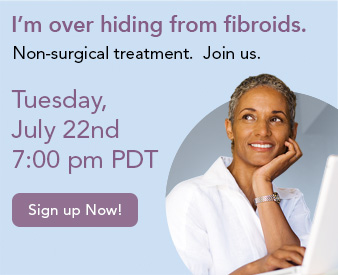Fibroids can be dangerous. Fibroid-related symptoms, such as excessive bleeding, anemia, painful cramps, and pressure in the pelvic region can seriously impact your life. As fibroids grow, so can the issues they cause. One of the most common is an enlarged uterus.
Having an enlarged uterus isn’t always problematic. After all, the uterus is capable of expanding to nearly the size of a watermelon in order to carry a baby. But if your uterus is swollen with fibroids that cause unwanted body distortion, pain, or anxiety? If fibroids have grown to the point where they affect your ability to move, sit, or sleep comfortably? It’s time to do something.
What Are the Symptoms of an Enlarged Uterus?
- Lower Abdominal Pain: The lower abdomen becomes painful, cramped, tense.
- Bloating: A constant feeling of fullness or pressure. Fibroids could be pushing on the intestines, impinging bowel function, and increasing gas production.
- Unexplained Weight Gain: As a fibroid grows, it gains mass and bulk that translates into pounds on the scale and expansion in the abdominal area.
- Constipation: When fibroids begin to press on the bowels, normal, healthy bowel movements are difficult.
- Pain: Discomfort in the legs, pelvis, and back? Pain during intercourse?All common with an enlarged uterus.
- Period Problems: Excessive bleeding, prolonged bleeding, clots during menstruation, extreme discomfort, anemia, and fatigue are all associated with an enlarging uterus.
- Frequent Urination: As the uterus swells, it often puts pressure on the bladder, resulting in more frequent urination or urinary incontinence.
- Pregnancy or Conception Problems: If you are pregnant, a fibroid enlarged uterus can cause premature labor or miscarriage. In women trying to conceive, implantation of a fertilized egg becomes more difficult.

What Are the Causes of an Enlarged Uterus?
Fibroids are a common cause of an expanding uterus in non-pregnant women. But they are not the only possible culprit.
Uterine Fibroids
It’s estimated that 75% of all women will have uterine fibroids at some point in their lives. Fibroids aren’t cancer. If your doctor diagnoses you with fibroids, there’s no need to panic. Most of the female population has them. But fibroids are a type of tumor. Please don’t ignore them. Untreated, certain types of fibroids can grow very large, very quickly. Occasionally, even to the size of a full-term baby.
Fibroid location and size usually determine the severity of symptoms. At-risk groups include:
- Women under 50
- Overweight or obese women
- African-American Women
Adenomyosis
When the tissue that normally lines the uterus grows into the muscular uterine wall, it creates a condition known as adenomyosis. The cause is unknown. But adenomyosis does seem to mostly affect women over 30 who have given birth. There is some indication that uterine surgery or C-section procedures increase the incidence of adenomyosis. A key symptom is progressively painful and heavy periods.
Ovarian Cysts
Cysts filled with fluid can develop on or within the ovary. Mostly, they will be harmless, causing little or no symptoms. Many will resolve on their own. But occasionally, an ovarian cyst continues to grow. Symptoms are sudden twinges or stabbing pains in the area. This type of cyst should be monitored by a physician. It can become dangerous, especially if it ruptures.

Uterine Cancer
This is the most serious of potential conditions that cause an enlarged uterus. Unlike fibroids, uterine cancer will require surgical removal of the uterus. Avoid being surprised by this unpleasant possibility. Have regular and thorough examines by your OB/GYN, including pap smears, pelvic imaging, and, when applicable, cancer screening tests.
Schedule A Consultation
Some women won’t address an enlarged uterus. They’ll suffer unwanted body changes, pain, and limitations. Please know that you don’t have to. You have options. You have power over your body. Choose to treat the problem rather than ignore it.
Ultimately and obviously, we recommend regular gynecological checkups. If you have a family history of uterine issues, make sure you get the screenings you need. If you’ve been diagnosed with fibroids, explore treatment. Don’t underestimate the damage fibroids cause to your life and your health. Don’t let a problem that can be solved easily and early, become the monster that rules you. When you’re ready, we’re ready to help.
Embolization Gave Patsy Her Freedom Back
After having 5 myomectomy procedures done, doctors told Patsy that her fibroids would continue to grow back. It was then that she decided to get a second opinion and discovered embolization. It has been over 20 years since Patsy had the embolization procedure done and she has been fibroid free ever since. Embolization gave Pasty … Read more


